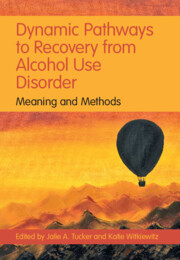Book contents
- Dynamic Pathways to Recovery from Alcohol Use Disorder
- Dynamic Pathways to Recovery from Alcohol Use Disorder
- Copyright page
- Dedication
- Contents
- Figures
- Tables
- Contributors
- Foreword
- Preface
- Acknowledgments
- Introduction
- Part I Micro Level
- Part II Meso Level
- Part III Macro Level
- Conclusions and Future Directions
- Index
- References
Conclusions and Future Directions
Published online by Cambridge University Press: 23 December 2021
- Dynamic Pathways to Recovery from Alcohol Use Disorder
- Dynamic Pathways to Recovery from Alcohol Use Disorder
- Copyright page
- Dedication
- Contents
- Figures
- Tables
- Contributors
- Foreword
- Preface
- Acknowledgments
- Introduction
- Part I Micro Level
- Part II Meso Level
- Part III Macro Level
- Conclusions and Future Directions
- Index
- References
Summary

- Type
- Chapter
- Information
- Dynamic Pathways to Recovery from Alcohol Use DisorderMeaning and Methods, pp. 413 - 426Publisher: Cambridge University PressPrint publication year: 2022



